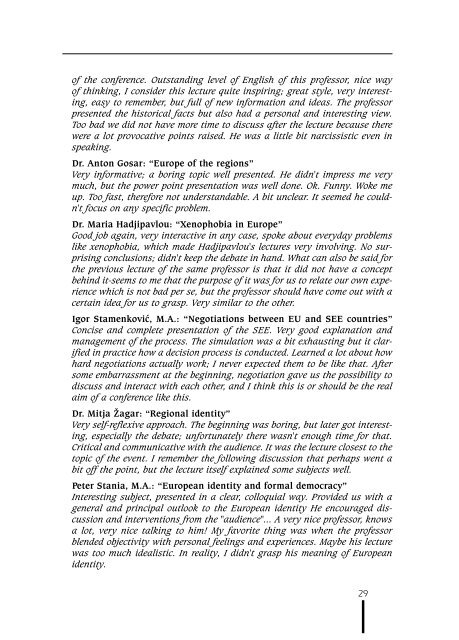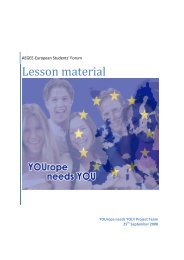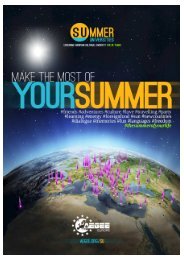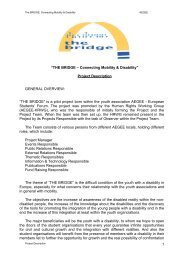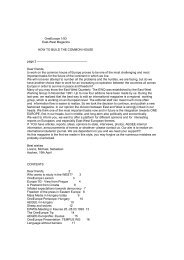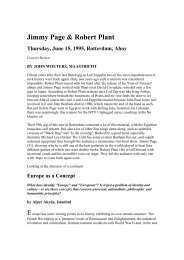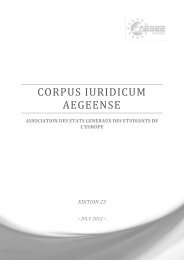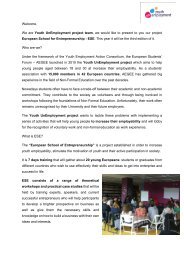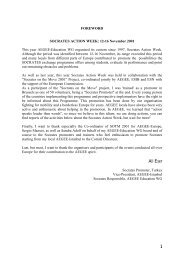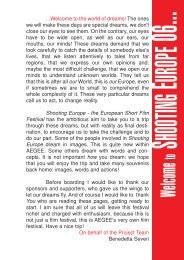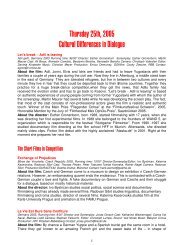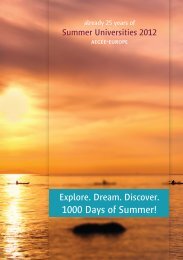europe's (torn?) identity - Projects - AEGEE Europe
europe's (torn?) identity - Projects - AEGEE Europe
europe's (torn?) identity - Projects - AEGEE Europe
You also want an ePaper? Increase the reach of your titles
YUMPU automatically turns print PDFs into web optimized ePapers that Google loves.
of the conference. Outstanding level of English of this professor, nice way<br />
of thinking, I consider this lecture quite inspiring; great style, very interesting,<br />
easy to remember, but full of new information and ideas. The professor<br />
presented the historical facts but also had a personal and interesting view.<br />
Too bad we did not have more time to discuss after the lecture because there<br />
were a lot provocative points raised. He was a little bit narcissistic even in<br />
speaking.<br />
Dr. Anton Gosar: “<strong>Europe</strong> of the regions”<br />
Very informative; a boring topic well presented. He didn't impress me very<br />
much, but the power point presentation was well done. Ok. Funny. Woke me<br />
up. Too fast, therefore not understandable. A bit unclear. It seemed he couldn't<br />
focus on any specific problem.<br />
Dr. Maria Hadjipavlou: “Xenophobia in <strong>Europe</strong>”<br />
Good job again, very interactive in any case, spoke about everyday problems<br />
like xenophobia, which made Hadjipavlou's lectures very involving. No surprising<br />
conclusions; didn't keep the debate in hand. What can also be said for<br />
the previous lecture of the same professor is that it did not have a concept<br />
behind it-seems to me that the purpose of it was for us to relate our own experience<br />
which is not bad per se, but the professor should have come out with a<br />
certain idea for us to grasp. Very similar to the other.<br />
Igor Stamenkovi}, M.A.: “Negotiations between EU and SEE countries”<br />
Concise and complete presentation of the SEE. Very good explanation and<br />
management of the process. The simulation was a bit exhausting but it clarified<br />
in practice how a decision process is conducted. Learned a lot about how<br />
hard negotiations actually work; I never expected them to be like that. After<br />
some embarrassment at the beginning, negotiation gave us the possibility to<br />
discuss and interact with each other, and I think this is or should be the real<br />
aim of a conference like this.<br />
Dr. Mitja @agar: “Regional <strong>identity</strong>”<br />
Very self-reflexive approach. The beginning was boring, but later got interesting,<br />
especially the debate; unfortunately there wasn't enough time for that.<br />
Critical and communicative with the audience. It was the lecture closest to the<br />
topic of the event. I remember the following discussion that perhaps went a<br />
bit off the point, but the lecture itself explained some subjects well.<br />
Peter Stania, M.A.: “<strong>Europe</strong>an <strong>identity</strong> and formal democracy”<br />
Interesting subject, presented in a clear, colloquial way. Provided us with a<br />
general and principal outlook to the <strong>Europe</strong>an <strong>identity</strong> He encouraged discussion<br />
and interventions from the "audience"... A very nice professor, knows<br />
a lot, very nice talking to him! My favorite thing was when the professor<br />
blended objectivity with personal feelings and experiences. Maybe his lecture<br />
was too much idealistic. In reality, I didn't grasp his meaning of <strong>Europe</strong>an<br />
<strong>identity</strong>.<br />
29


